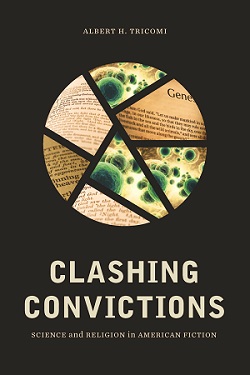Clashing ConvictionsScience and Religion in American FictionAlbert H. TricomiLiterature, Religion, and Postsecular Studies |
 July 21, 2016 280 pp. 6x9  $84.95 printed case 978-0-8142-1306-3 Add printed case to shopping cart $29.95 paperback 978-0-8142-5307-6 Add paperback to shopping cart $29.95 PDF eBook Add PDF eBook to shopping cart Shopping Cart Instructions Review/Change Shopping Cart & Check-out | |||
|
“Clashing Convictions will be of particular interest to the subfields of Literature and Science, Literature and Religion, and Literature and Medicine, but it should also be of interest to scholars and students in the general fields of American Literature, American Studies, American Cultural History, the History of Science, and the History of Religion. This is one of those books which surprises you that it has not been done before, and it is done very well.” —Brenda Murphy, University of Connecticut Clashing Convictions: Science and Religion in American Fiction is the first study to identify a body of twentieth-century American fiction that represents the increasing tensions experienced by people of Christian faith in response to Darwinism, the higher biblical criticism, and modern medicine. Delineating how these works dramatize clashes between scientific and conservative Protestant understandings of the world, Albert H. Tricomi examines a canon of ten novels and one iconic play that present a cultural history of inner turmoil as well as social conflict. The three parts of the study chart this increasing inner turmoil, a rising secularist ideology, and finally a fundamentalist revival among alienated biblical literalists. With chapters on James Lane Allen’s The Reign of Law, Harold Frederic’s The Damnation of Theron Ware, William Dean Howells’s The Leatherwood God, Sinclair Lewis’s Arrowsmith and Elmer Gantry, Jerome Lawrence and Robert E. Lee’s Inherit the Wind, and James Scott Bell’s The Darwin Conspiracy, Tricomi offers new readings emphasizing how this canon represents science and religion as in deep, if not irreconcilable, conflict. Tricomi’s sweeping study, with its emphasis on the twentieth century, thus reveals from several directions the processes of secularism even as it identifies the emergence of what some have come to describe as the current “postsecular” moment in America. Albert H. Tricomi is Distinguished Teaching Professor Emeritus in the Department of English at Binghamton University (SUNY). | ||||

